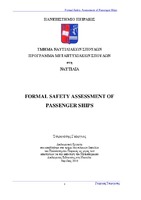Formal safety assessment of passenger ships

Master Thesis
Συγγραφέας
Τσιριγώτης, Γεώργιος
Ημερομηνία
2010-11-09Προβολή/
Θεματική επικεφαλίδα
Πλοία -- Κανονισμοί ασφαλείας ; Ναυτιλία -- Μέτρα ασφαλείας ; Ναυτιλία -- Δίκαιο και νομοθεσίαΠερίληψη
The safety of vessels has been of concern to mariners for centuries. Concepts of vessel stability, the possibility of capsizing, and structural integrity have been recognized by shipbuilders and operators from the beginning of marine shipping industry. The concepts of metacentre and restoring arm as initial stability criteria for small heel angles and practical methodologies for their evaluation were introduced in 18th century. The Formal Safety Assessment process has been defined by the IMO as: structured and systematic methodology, aimed at enhancing maritime safety, including protection of life, health, the marine environment and property by using risk analysis and cost benefit assessment. The method is applicable to consider the safety of vessels in a global sense (all systems) or to take into account subsystems or individual aspects of safe operations. It could be applied in situations where risk needs to be reduced but required decisions are not clearly defined and need to be analysed. It can be applied during ship design stages or to analyse single operational aspects of existing vessels. The process can be used to validate existing and/or new regulations developed applying prescriptive or risk based principles. It should be kept in mind that shipping is a true international business and that the safety regime in principle shall be the same for developing and developed nations. It is well known that this is not the case and that the motivation and ability to enforce international standards is highly different. FSA will involve the risk basic risk analysis steps and benefit-cost assessment. The intention is that FSA may contribute to identification of risks not covered by the regulations and obtain a set of controls that are more effective.


